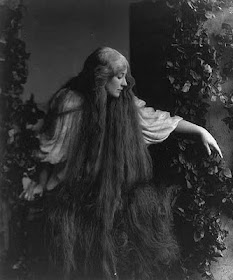Debussy, Pelléas et Mélisande, N. Dessay, S. Degout, L. Naouri, ORF Radio-Symphonieorchester Wien, B. de Billy (released on January 12, 2010) Virgin Classics 50999 696 1379 1 2h 43min Online scores: Debussy, Pelléas et Mélisande |
Gillian Opstad, Debussy's Mélisande: The Lives of Georgette Leblanc, Mary Garden, and Maggie Teyte (Boydell Press, 2009) |
Naouri is an eerily calm Golaud, deeply troubled but disturbingly placid on the surface, with an almost character-less, metallic tone to the voice. French baritone Stéphane Degout does well as Pelléas (the role is sung either by a tenor or a high baritone), although surpassed by contralto Marie-Nicole Lemieux as Geneviève (mother of Golaud and Pelléas, by different fathers), whose tight-bunned, high-necked severity recalls both Kathy Bates in Misery and Mrs. Bates in Psycho. Phillip Ens is a resonant, somewhat distracted Arkel, who wanders about the stage like a patient in a nursing home. The ORF Radio-Symphonieorchester Wien, shown many times in a full view of the open orchestra pit, plays the score extremely well. That is much to the credit of conductor Bertrand de Billy, who brings out the Wagnerian qualities of the score, analyzed in great detail by Robin Holloway.
 Mary Garden as Mélisande |
For this new staging, Laurent Pelly seems to have placed the action in a stuffy, conservative mansion of dark wood panels (sets by Chantal Thomas), perhaps evoking Maeterlinck's home, with everyone dressed in drab browns and grays (costumes by Pelly), and little surviving of the oppressive forests except a few denuded vines and the shadow of dead branches (lighting by Joël Adam). The sets move in and out of view on a rotating part of the stage, with the characters walking through them and often reflecting or reacting between scenes, an excellent way to make the gorgeous interludes, added by Debussy late in the score's development to accommodate lengthy set changes at the Opéra-Comique's Salle Favart, be a part of the dramatic whole. Since the opera has been staged only once by Washington National Opera, in the company's adventurous first decade (1959-60), it is high time to bring it back for a twice-in-a-century appearance. For a somewhat different experience of the opera, you can also try the upcoming performances of the opera, in English and using the musical distillation by Marius Constant, by Opera Vivente in Baltimore (February 26 to March 6).
No comments:
Post a Comment